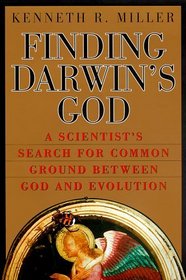Gary A. (doublea1971) reviewed Finding Darwin's God: A Scientist's Search for Common Ground Between God and Evolution on + 8 more book reviews
Miller does a great job toeing the line between uncovering the differences between "other" Christian views of evolution/Darwinianism (i.e. - Intelligent Design, young-earth Creationists, etc) and his own. He gives credit to opposing viewpoints where credit is rightly due. He shreds false arguments where those are readily apparent as well.
Miller probably finds few kindred spirits among modern Evangelical Christianity, but he must be commended for applying Scientific evidences to arguments (both good and bad arguments).
Miller's answer may not be the correct one (and probably not in the eyes of most), but he does a good job in this book of surveying the landscape of points of view in the Christian community. He writes VERY intelligently, VERY readibly, and I recommend this book to anyone wanting to get a good survey view of the Bible/Darwinism argument.
Miller probably finds few kindred spirits among modern Evangelical Christianity, but he must be commended for applying Scientific evidences to arguments (both good and bad arguments).
Miller's answer may not be the correct one (and probably not in the eyes of most), but he does a good job in this book of surveying the landscape of points of view in the Christian community. He writes VERY intelligently, VERY readibly, and I recommend this book to anyone wanting to get a good survey view of the Bible/Darwinism argument.
Robert K. reviewed Finding Darwin's God: A Scientist's Search for Common Ground Between God and Evolution on + 98 more book reviews
A fair and balanced rebuttal of "Intelligent Design" from a practicing biologist (but I don't think he entirely disproves or understands what Michael Behe is saying in "Darwin's Black Box").
Maureen M. reviewed Finding Darwin's God: A Scientist's Search for Common Ground Between God and Evolution on + 7 more book reviews
From Publishers Weekly
Though he takes a different tack than Wyller (above), Miller tries to draw a straight line between two apparently opposing ideas: the theory of evolution and belief in a creator. In a more humanistic account than Wyller's, Miller, a professor of biology at Brown University, explains the difference between evolution as validated scientific fact and as an evolving theory. He illustrates his contentions with examples from astronomy, geology, physics and molecular biology, confronting the illogic of creationists with persuasive reasons based on the known physical properties of the universe and the demonstrable effects of time on the radioactivity of various elements. Then standing firmly on Darwinian ground, he turns to take on, with equal vigor, his outspoken colleagues in science who espouse a materialistic, agnostic or atheistic vision of reality. Along the way, he addresses such important questions as free will in a planned universe. Miller is particularly incisive when he discusses the emotional reasons why many people oppose evolution and the scientific community's befuddled, often hostile, reaction to sincere religious belief. Throughout, he displays an impressive fairness, which he communicates in friendly, conversational prose. This is a book that will stir readers of both science and theology, perhaps satisfying neither, but challenging both to open their minds. Illustrations. Author tour.
Though he takes a different tack than Wyller (above), Miller tries to draw a straight line between two apparently opposing ideas: the theory of evolution and belief in a creator. In a more humanistic account than Wyller's, Miller, a professor of biology at Brown University, explains the difference between evolution as validated scientific fact and as an evolving theory. He illustrates his contentions with examples from astronomy, geology, physics and molecular biology, confronting the illogic of creationists with persuasive reasons based on the known physical properties of the universe and the demonstrable effects of time on the radioactivity of various elements. Then standing firmly on Darwinian ground, he turns to take on, with equal vigor, his outspoken colleagues in science who espouse a materialistic, agnostic or atheistic vision of reality. Along the way, he addresses such important questions as free will in a planned universe. Miller is particularly incisive when he discusses the emotional reasons why many people oppose evolution and the scientific community's befuddled, often hostile, reaction to sincere religious belief. Throughout, he displays an impressive fairness, which he communicates in friendly, conversational prose. This is a book that will stir readers of both science and theology, perhaps satisfying neither, but challenging both to open their minds. Illustrations. Author tour.




